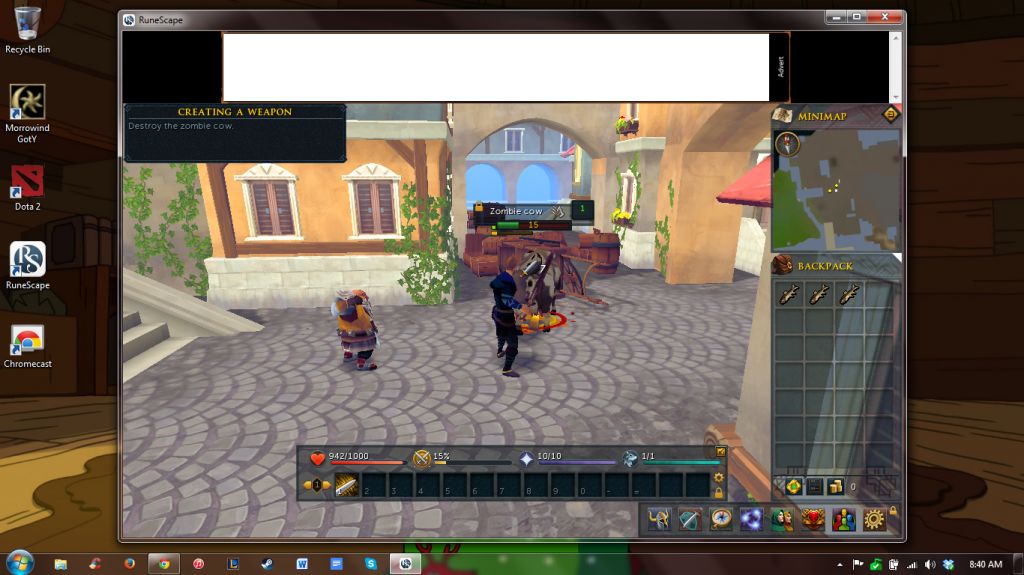After nearly ten years away from Jagex’s massively successful online multiplayer game, I have returned to Gielinor once more—to grind my mining and woodcutting skills one last time. Runescape 3 was released in 2013 and its first expansion, “Lost City of the Elves,” released in 2014. To my surprise (and relief), little has changed.
For those unfamiliar, Runescape is the first and most popular browser-based MMORPG of all time, and, to date, it holds Guinness World Records for the largest and most-updated free MMORPG. It is the first free MMO to successfully utilize B.F. Skinner’s theories of reinforcement to attract and hook players, and it is the first “freemium” MMORPG—the first online game to give players an option to pay to play larger maps and bigger bosses. It is, without a doubt, one of the most influential video games of the 21st century. Here is a brief history of the game.
[caption id="" align="aligncenter" width="518"] (source: http://www.eclipseorigins.com/community/index.php?/topic/132154-live-streaming-runescape-2007-progress)[/caption]
(source: http://www.eclipseorigins.com/community/index.php?/topic/132154-live-streaming-runescape-2007-progress)[/caption]
In 1999, Andrew and Paul Gower developed Runescape. Originally slated as a text-based multi-user dungeon (MUD), it was soon updated to include crude 2D backgrounds and 3D sprites. The brothers first released the game in beta in January 2001, and, due to the beta’s massive success, they recruited Constant Tedder, formed the company Jagex, and released the game in full In December 2001
In February 2002, Jagex introduced a monthly subscription service. Membership allowed users to access areas, quests, dungeons, bosses, and items unavailable in the vanilla game. The membership system marked the first time a free browser-based MMO had charged customers to access content. The subscription service was extremely popular. And as a result, several games began to follow Runescape’s business model.
Shortly after the subscription service was introduced, Jagex developers began rewriting and updating the game. In 2004, Runescape 2 was launched. (This is the version most users are familiar with.) Runescape 2 was completely 3D and contained larger map and a greater assortment of skills. Although the game still looked extremely out-dated, the game was addictive, fun, and intuitive. Critics and players loved it. Shortly after Runescape 2 was introduced, the name was changed to simply Runescape; the original game was renamed Runescape Classic.
Among the game's many improvements, Jagex introduced the Wilderness, a player versus player arena that pitted players of equivalent level against each other. The Wilderness was, by far, the game's most enjoyable feature. It lie in the far north country in a barren wasteland filled with volcanoes and glaciers. Players would walk around, picking up minor items and looking for opponents. Fights often occurred at rare drops near the top of the map. Upon death, players dropped almost all their items, save a few core weapons. Such risk made the game incredibly addictive; players either reaped incredible rewards or dropped months of rare, grinded items, armor, and weapons. (I have fond memories of claiming a set of gold-trimmed black armor from a Wilderness kill. I wore it for months--long after it had lost its usefulness.) Despite its flaws, Runescape's PvP was among the most enthralling online gaming experiences of the early 2000s.
[caption id="" align="aligncenter" width="536"] (source: http://coinarcade.org/2013/02/20/runescape-launching-2007-build-server)[/caption]
(source: http://coinarcade.org/2013/02/20/runescape-launching-2007-build-server)[/caption]
On January 12, 2006, Runescape banned more than 5,000 Classic accounts for cheating. Wrongly accused players plead their cases to Jagex, but their accounts and their upgrades had been lost; their purchases were not refunded. Due to this, many community members, including ones that had not been banned, left the game. Since then, Jagex has had a hard time keeping subscribers. Few people continue to play Runescape classic.
In February 2012, Runescape released the "Squeal of Fortune," an event that allowed players to spin a wheel once per day for items and power ups. In April 2012, Jagex began allowing players to use real world currency to buy more spins, bringing microtransactions to the game. Die-hard community players complained to Jagex again, arguing that such money-making strategies cheapened the game. They felt betrayed.
Later that year, the company released Solomon's General Store, a vendor that supplied cosmetics for Runecoins, in-game coins purchased with real currency. Again, the community cried out. Jagex staff replied by stating that microtransactions had little effect on the overall game and that such purchased were necessary for the survival of the game. Players were not convinced. As a result, the Squeal of Fortune was replaced with Treasure Hunter, a more user-friendly microtransaction game that allowed players to open chests with keys. The company also began allowing players to earn Runecoins by watching ads and trying various products.
In 2012, Jagex began working on an HTML 5 version of the game, promising to make Runescape available on tablets, smart TVs, and various other platforms. They also promised a fully customizable user interface and better audio. In 2013, Jagex released Runescape 3, a complete overhaul that delivered on nearly all of their lofty, idealistic oaths. The latest version of the game contains a tutorial story arc, an updated combat system, improved graphics, a limited number of character voices, and a new orchestrated soundtrack. That said, the game still feels and plays like the Runescape I loved in 2004. It looks and feels the way I remember it. Although it has set backs, it is a great way to kill a couple hours between work shifts or classes.
I signed in to Runescape 3 with my Facebook account; it took nearly five minutes to load--impressive, given I was expecting the game's typical hour-long updates. I guess time can, in fact, change things for the better. I was also blown away by the character customization options. The game is no Skyrim, but I was expecting sprites. The clothing and hair options are sleek; I spent nearly thirty minutes finding the perfect look.
The introductory story does a great job getting the player immersed in the game. I (re)learned all the basic skills and had a lot of fun learning about the zombies and sea creatures invading my small home island. I even killed a zombie cow. It was awesome.
I then embarked for the mainland. Upon landing, I began a series of quests and started collecting special introductory items and weapons. I fought, defeated, and released a necromancer and his goons (the game gave me an option to kill them, but I'm a pacifist), I destroyed a giant sea monster, I helped Lumbridge build a better town image (I got a cape for doing it), and I helped the chef in Lumbridge make a cake for the king. And then I killed cows and buried their bones.
[caption id="attachment_38211" align="aligncenter" width="614"] Yep. That's a zombie cow.[/caption]
Yep. That's a zombie cow.[/caption]
I really like how interactive the game has become. When I am playing, I truly feel like my actions are affecting the shape of the world, from my in-game decisions to my responses to community polls. Everything seems to have consequences. When I let the necromancer run free, I feel like I have changed the game a little bit. Runescape 3 feels player-driven, something other incarnations of the game have been missing. I love it.
I also love the new combat system. As a player that enjoyed playing a well-rounded character, I am now rewarded for leveling my combat skills evenly. In the past, melee was incredibly overpowered. By the time I stopped playing in early 2006, almost everyone weilded a sword. Archery and magic were cumbersome, over-complicated, and weak. The new system, called the Combat Triangle, fixes a lot of these problems. It works a lot like paper, rock, scissors--melee beats archery, archery beats magic, and magic beats melee. Runescape also contains a new, useful, more balanced prayer system. Prayer is much more useful than ever before. I can now use prayer to supplement my archery and magic skills, something absent from early versions of the game.
That said, grinding is as prevalent as ever. It still takes hours to train mining, smelting, cooking, fishing, and woodcutting skills. After about an twenty minutes of mining, I feel less like I am playing a computer game and more like I am working in an actual mine. As the game has evolved, the number of skills available have bloated. It seems like there is a skill for nearly everything. And over half of the skills are unavailable for free-to-play users.
In fact, very little is available in the vanilla game--which is one of Runescape's major problems. Players can only access a tiny portion of the map, fight a limited variety of enemies, level few skills, and access only a couple dozen quests. After about two hours of gameplay, the game begins to feel less like a complete game and more like a demo. I quickly began to get bored with it; I ran out of things to do. And I didn't feel hooked enough to want to buy it.
To be honest, I really enjoyed playing Runescape 3. There. I said it. What little I could afford to play was a lot of fun. The story, dungeons, and rewards were very fulfilling. It was a fun, nostalgic romp through the fields of my adolescence. The soundtrack was beautiful, the characters voices were spot-on, and thrill of killing things felt great.
That said, I doubt I will get around to playing it again any time soon. The game was fun, but it wasn't fun enough to warrant spending money on it.